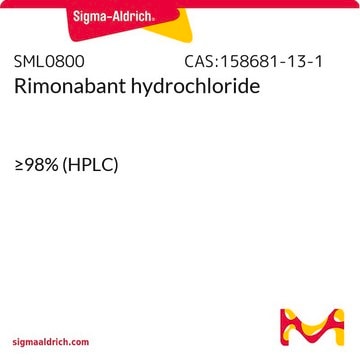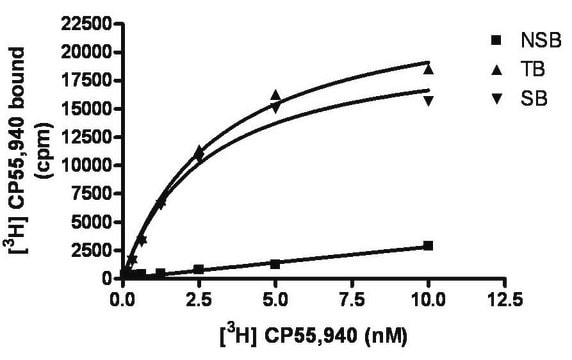C1112
CP-55940
>98% (HPLC), powder
Synonyme(s) :
5-(1,1-Dimethylheptyl)-2-[5-hydroxy-2-(3-hydroxypropyl)cyclohexyl]phenol
About This Item
Produits recommandés
Niveau de qualité
Pureté
>98% (HPLC)
Forme
powder
Activité optique
[α]/D -24 to -30°, c = 0.2 in chloroform-d
Contrôle du médicament
regulated under CDSA - not available from Sigma-Aldrich Canada
Conditions de stockage
desiccated
Solubilité
DMSO: 15 mg/mL
H2O: slightly soluble
Température de stockage
2-8°C
Chaîne SMILES
CCCCCCC(C)(C)c1ccc([C@@H]2C[C@H](O)CC[C@H]2CCCO)c(O)c1
InChI
1S/C24H40O3/c1-4-5-6-7-14-24(2,3)19-11-13-21(23(27)16-19)22-17-20(26)12-10-18(22)9-8-15-25/h11,13,16,18,20,22,25-27H,4-10,12,14-15,17H2,1-3H3/t18-,20-,22-/m1/s1
Clé InChI
YNZFFALZMRAPHQ-SYYKKAFVSA-N
Informations sur le gène
human ... CNR1(1268) , CNR2(1269)
rat ... Cnr1(25248)
Application
Actions biochimiques/physiologiques
Caractéristiques et avantages
Mention d'avertissement
Warning
Mentions de danger
Conseils de prudence
Classification des risques
STOT SE 3
Organes cibles
Respiratory system
Code de la classe de stockage
11 - Combustible Solids
Classe de danger pour l'eau (WGK)
WGK 3
Point d'éclair (°F)
Not applicable
Point d'éclair (°C)
Not applicable
Équipement de protection individuelle
Eyeshields, Gloves, type N95 (US)
Certificats d'analyse (COA)
Recherchez un Certificats d'analyse (COA) en saisissant le numéro de lot du produit. Les numéros de lot figurent sur l'étiquette du produit après les mots "Lot" ou "Batch".
Déjà en possession de ce produit ?
Retrouvez la documentation relative aux produits que vous avez récemment achetés dans la Bibliothèque de documents.
Les clients ont également consulté
Articles
A large variety of cannabinoid drug standards, along with an HPLC method with the Supelco Ascentis® Express RP-Amide column, are presented in this article.
A large variety of cannabinoid drug standards, along with an HPLC method with the Supelco Ascentis® Express RP-Amide column, are presented in this article.
A large variety of cannabinoid drug standards, along with an HPLC method with the Supelco Ascentis® Express RP-Amide column, are presented in this article.
A large variety of cannabinoid drug standards, along with an HPLC method with the Supelco Ascentis® Express RP-Amide column, are presented in this article.
Notre équipe de scientifiques dispose d'une expérience dans tous les secteurs de la recherche, notamment en sciences de la vie, science des matériaux, synthèse chimique, chromatographie, analyse et dans de nombreux autres domaines..
Contacter notre Service technique













